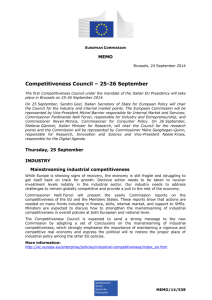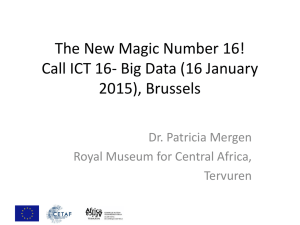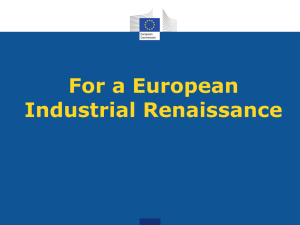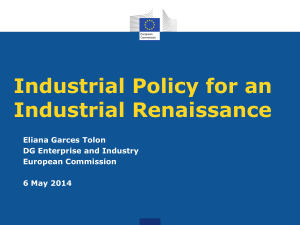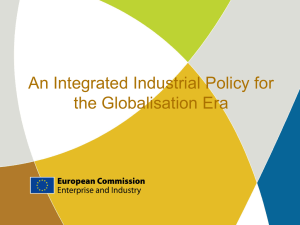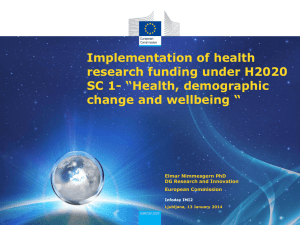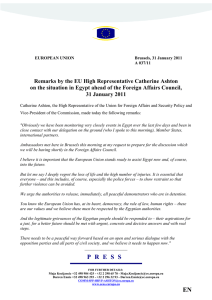DOC
advertisement
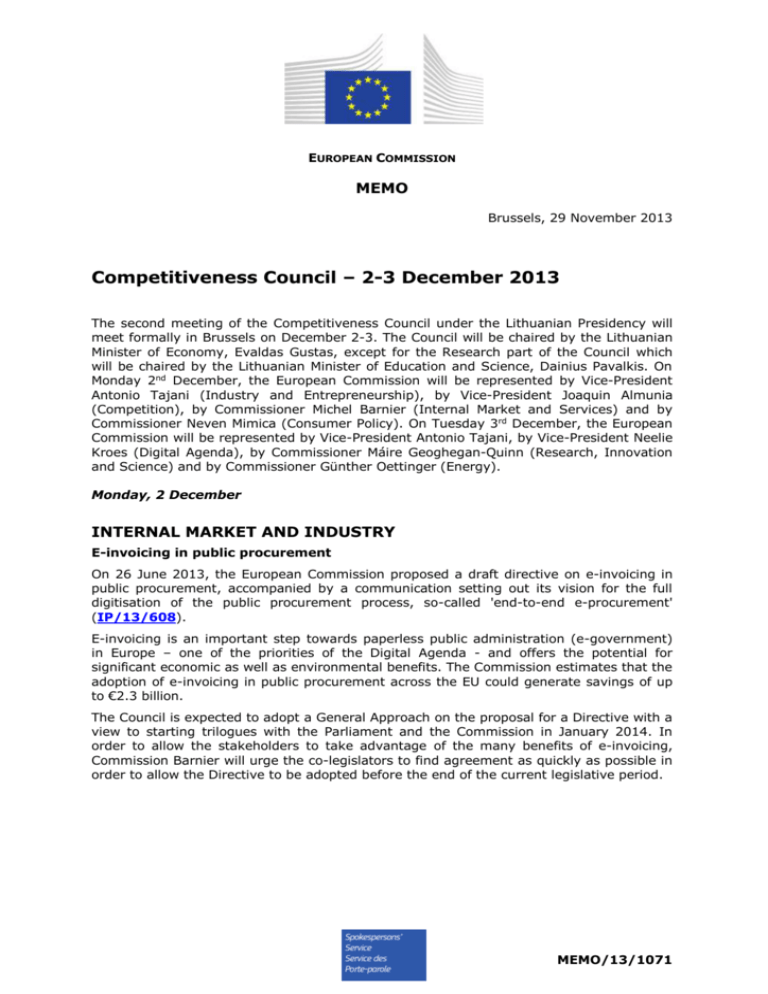
EUROPEAN COMMISSION MEMO Brussels, 29 November 2013 Competitiveness Council – 2-3 December 2013 The second meeting of the Competitiveness Council under the Lithuanian Presidency will meet formally in Brussels on December 2-3. The Council will be chaired by the Lithuanian Minister of Economy, Evaldas Gustas, except for the Research part of the Council which will be chaired by the Lithuanian Minister of Education and Science, Dainius Pavalkis. On Monday 2nd December, the European Commission will be represented by Vice-President Antonio Tajani (Industry and Entrepreneurship), by Vice-President Joaquin Almunia (Competition), by Commissioner Michel Barnier (Internal Market and Services) and by Commissioner Neven Mimica (Consumer Policy). On Tuesday 3rd December, the European Commission will be represented by Vice-President Antonio Tajani, by Vice-President Neelie Kroes (Digital Agenda), by Commissioner Máire Geoghegan-Quinn (Research, Innovation and Science) and by Commissioner Günther Oettinger (Energy). Monday, 2 December INTERNAL MARKET AND INDUSTRY E-invoicing in public procurement On 26 June 2013, the European Commission proposed a draft directive on e-invoicing in public procurement, accompanied by a communication setting out its vision for the full digitisation of the public procurement process, so-called 'end-to-end e-procurement' (IP/13/608). E-invoicing is an important step towards paperless public administration (e-government) in Europe – one of the priorities of the Digital Agenda - and offers the potential for significant economic as well as environmental benefits. The Commission estimates that the adoption of e-invoicing in public procurement across the EU could generate savings of up to €2.3 billion. The Council is expected to adopt a General Approach on the proposal for a Directive with a view to starting trilogues with the Parliament and the Commission in January 2014. In order to allow the stakeholders to take advantage of the many benefits of e-invoicing, Commission Barnier will urge the co-legislators to find agreement as quickly as possible in order to allow the Directive to be adopted before the end of the current legislative period. MEMO/13/1071 More information: http://ec.europa.eu/internal_market/publicprocurement/e-procurement/e-invoicing/index_en.htm Revision of the European Trademark system On 27 March 2013, the European Commission presented a package of initiatives to make trade mark registration systems all over the European Union cheaper, quicker, more reliable and predictable (IP/13/287). The proposed reform will, if adopted, improve conditions for businesses to innovate and to benefit from more effective trade mark protection against counterfeits, including fake goods in transit through the EU's territory. The Council Working Group has been examining the Commission proposals and while Member States have largely welcomed the objectives of the reform, technical discussions are complex and are not finished yet. The Council is expected to take note of a Presidency report on the progress of discussions on the file. Commissioner Barnier will welcome this report as important progress, but at the same time urge the Council to make every effort to conclude this important reform under the current legislature. More information: http://ec.europa.eu/internal_market/indprop/tm/ Policy debate on contribution to the European Semester and upcoming European Council meetings The Commission will present the Annual Growth Survey and its annual Report on Single Market Integration. The Annual Growth Survey launches the 2014 European Semester for economic policy coordination, which ensures that Member States align their budgetary and economic policies with the Stability and Growth Pact and the Europe 2020 Strategy. The key message of the Annual Growth Survey 2014 is the importance of strengthening the recovery that is already underway. The second annual Report on Single Market Integration assesses the functioning of key single market sectors across Member States and on that basis identifies policy priorities for national reforms. The key sectors covered by the Report are: services, financial services, energy, transport, digital single market. In particular, Ministers will discuss how to foster industrial competitiveness in Europe and potential areas of closer coordination of economic policies, including monitoring of progress in the structural reforms which have the most prominent positive effects on competitiveness. The European Council on industrial competitiveness in February 2014 will provide a unique opportunity to define the course for re-industrialising Europe at the highest political level. The Competitiveness Council is expected to send a strong message to the European Council by adopting three sets of Council conclusions on European Industrial Policy, Internal Market Policy and on Smart Regulation. More information: http://ec.europa.eu/europe2020/making-it-happen/ http://ec.europa.eu/enterprise/policies/industrial-competitiveness/index_en.htm 2 Defence For the EU's Common Security and Defence policy (CSDP) to be credible, Europe needs a strong defence industrial and technological base. To achieve this objective, it is crucial to develop a European Defence Industrial Policy. The defence industry is not only of strategic importance for Europe’s security, it also plays a crucial role in the wider European economy. Its cutting-edge research has created important indirect effects in other sectors, such as electronics, space and civil aviation and provides growth and thousands of highly skilled jobs. To maintain a competitive industry capable of producing at affordable prices the capabilities we need, it is essential to strengthen the internal market for defence and security and to create conditions which enable European companies to operate freely in all Member States. In July, the Commission adopted a Communication to promote the competitiveness and efficiency of the defence and security sector. The key features of the Communication were to deepen the Internal Market by tackling market distortions and improving security of supply; strengthen competitiveness through promoting common standards, certification and networks between Europe's regions; and exploit civil / military synergies, especially in research. On the basis of the Communication, the Council will discuss actions to strengthen Europe’s defence industry, in particular how to facilitate cross-border market access for SMEs and to promote civil military synergies. These discussions will provide input for the European Council in December. More information: http://ec.europa.eu/enterprise/sectors/defence/defence-industrial-policy/index_en.htm IP/13/734: Safety and Market Surveillance Package The Ministries will discuss the state of progress of discussions on the 'Product Safety and Market Surveillance Package' adopted by the European Commission on 13 February 2013. The Package is key in our efforts to step up the enforcement of internal market legislation. It is needed to ensure that the public interest objectives - health and safety of consumers and/or professional users, environment, security, etc. - that EU rules are meant to safeguard are in fact properly protected. It is also indispensable to guarantee a level playing field where honest and law-abiding businesses are not threatened by unfair competition due to non-compliant products. 3 More information: http://ec.europa.eu/enterprise/policies/single-market-goods/internal-market-forproducts/market-surveillance/index_en.htm COMPETITION Proposal for a Directive on certain rules governing actions for damages under national law for infringements of the competition law provisions of the Member States and of the European Union On 11 June 2013, the Commission has adopted a proposal for a Directive on Antitrust Damages Actions. This proposal serves two complementary goals: Ensuring that any person who suffered harm as a result of a competition law infringement may effectively exercise his right to full compensation, to which he is entitled under EU law. Optimizing the interplay between the private enforcement and the public enforcement. The Proposal fully acknowledges the pivotal role played by competition authorities in investigating and sanctioning the infringements of competition law and therefore provides for a number of safeguards designed to ensure that facilitation of private damages actions does not compromise the ability of competition authorities to effectively enforce competition rules. The proposal was sent to the European Parliament and to the Council for adoption under the ordinary legislative procedure. The proposal for a Directive on Antitrust Damages Actions is on the agenda of the Competitiveness Council for adoption of a General Approach. Adoption of a General Approach gives the Council a mandate for negotiations with the European Parliament in the framework of trialogues. More information on the Commission's Proposal can be found here: http://ec.europa.eu/competition/antitrust/actionsdamages/proposed_directive_en.html 4 Tuesday 3 December INDUSTRY –SPACE Copernicus The Copernicus Earth observation programme is a complex set of systems which collects information from multiple sources: earth observation satellites as well as ground-based, airborne and sea-borne sensors. It integrates and processes all this information, providing users with reliable and up-to-date information through a set of services related to environmental and security issues. Following the European Council proposal in February 2013 to finance Copernicus within the next Multiannual Financial Framework, in July the Commission issued a proposal for a Regulation establishing this programme. Since then, the Council has been working intensively under the Lithuanian Presidency to reach an agreement between the Member States on a text. On several occasions Vice-President Tajani has stressed the importance of the Copernicus initiative for protecting the European environment and for the safety of European citizens, while creating opportunities for growth and employment. The Competitiveness Council is expected to adopt a General Approach on the Commission’s proposal in order to facilitate an agreement on first reading with the European Parliament. In this context, Vice-President Tajani will reiterate his willingness to see the Regulation adopted swiftly in order not to delay the implementation of the programme and delivery of the services. He will also reaffirm that a delayed adoption could result in the loss of the planned 2014 Copernicus budget for the European industry. More information: http://ec.europa.eu/enterprise/policies/space/copernicus/ Memo/13/1036: The countdown to the launch of the first Copernicus satellite has begun Space Surveillance and Tracking Support Programme The aim of this proposal is to support the emergence of SST services at European level to mitigate the risks from space debris to space infrastructures - in particular those of Galileo and Copernicus - by helping satellite operators to undergo the necessary avoidance manoeuvres. It also aims to mitigate the risks to citizens generated by uncontrolled reentries of hazardous space objects into the Earth atmosphere; by helping public authorities plan and conduct necessary actions to safeguard and possibly rescue local populations within the impact area. The European SST service will build on a network of existing SST assets, mainly radars and telescopes, owned by Member States. The Presidency has reported on the state of play of the discussion in Council regarding the Commission proposal aiming at establishing an SST Support Programme. Given the political support for this initiative and the urgency to deliver the first SST services, Commission hopes that this proposal will be adopted in the first half of 2014. MEMO/13/149: Avoiding damage from space debris - space surveillance and tracking proposal 5 RESEARCH Horizon 2020 Following the positive vote in the European Parliament on 21 November, Ministers are expected to adopt the Regulation establishing Horizon 2020, the next EU research and innovation programme, as well as the proposals setting up the European Institute of Innovation and Technology (EIT) in the next seven years. With a budget of nearly €80 billion for 2014-2020, Horizon 2020 is the biggest EU research programme yet, and also one of only very few programmes in the next EU budget to see a strong increase in funding – a nearly 30 per cent jump in real terms over the current Seventh Framework Programme. It is a totally new type of research programme for the EU, designed to deliver results that make a difference to people's lives. Built on three pillars – Excellent Science, Industrial Leadership and Societal Challenges - it will fund all types of activities, from frontier science to close-to-market innovation. The programme for the first time brings all EU-level funding for research and innovation under one roof, provides a single set of rules and will radically slash red tape. Commissioner Geoghegan-Quinn will recall the tremendous effort by all institutions involved in the past two years in launching the programme, and encourage researchers and innovators from across Europe to participate already in the first calls for proposals to be announced on 11 December. More information: Horizon 2020: http://ec.europa.eu/research/horizon2020/index_en.cfm?pg=home European Institute of Innovation and Technology: http://eit.europa.eu/ Innovation Investment Package Ministers will be invited to adopt a General Approach on proposals to establish the socalled Article 185 and Article 187 initiatives under Horizon 2020. The Innovation Investment Package, adopted by the Commission on 10 July 2013, contained four proposals for partnerships in research and innovation with the Member States (publicpublic partnerships based on Article 185 TFEU) and five proposals for partnerships with industry and the Member States (public-private partnerships based on Article 187 TFEU). The four public-public partnerships (Art 185s) are proposed in the areas of new treatments against poverty-related diseases, measurement technologies for industrial competitiveness, support for high tech SMEs and solutions for the elderly and disabled to live safely in their homes. They amount to a total public budget of almost €3.5 billion, where Horizon 2020 would provide funds of around €1.5 billion if participating states commit €2 billion. These partnerships create a long term and strategic form of working together, which involves a true integration between Member States’ programmes, in all aspects of a joint research programme – at financial, scientific and managerial level. 6 The five public-private partnerships (Art 187s) are proposed in the areas of innovative medicines, aeronautics, bio-based industries, fuel cells and hydrogen, and electronics. For the five programmes in total, a proposed €6.4 billion investment from Horizon 2020 will secure almost €10 billion from industry and €1.2 billion from the Member States. These research partnerships will boost the competitiveness of EU industry in sectors that already provide more than 4 million jobs. They will also find solutions to major challenges for society that are not being solved quickly enough by the market alone. Commissioner Geoghegan-Quinn will recall that these partnerships are powerful implementation tools of Horizon 2020 that will ensure a better investment in research and innovation, creating growth and new jobs and reinforcing Europe’s international competitiveness. More information: Innovation Investment Package: http://europa.eu/rapid/press-release_IP-13-668_en.htm INTERNAL MARKET Collective rights management On 11 July 2012, the European Commission proposed measures to modernise collective management organisations and put in place incentives to promote their transparency and efficiency (IP/12/722). New digital technologies are opening up great opportunities for creators, consumers and businesses alike. Increased demand for online access to cultural content (e.g. music, films, books) does not recognise borders or national restrictions. Neither do the online services used to access them. In this respect, collective management organisations play a particularly important role in the music sector, where they will now be able to grant multiterritorial licences to online service providers more easily. Commissioner Barnier will welcome the trilogue agreement reached on 4 November (MEMO/13/955). 7 More information: http://ec.europa.eu/internal_market/copyright/management/index_en.htm European Patent and Unified Patent Court Intellectual Property Rights contribute to a large extent to economic growth and job creation in Europe, as recently demonstrated in a study on Intellectual Property Rights intensive industry (IP/13/889). In this light, the unitary patent will be a key tool for companies using their invention on the domestic European market. On 17 December 2012 two Regulations 1257/2012 and 1260/2012 by the Council and Parliament and on 17 February 2013, Member States signed an Agreement which set up the framework for the future Unitary patent and the jurisdiction for dealing with related disputes. However, more work is needed to ensure the entry into force of the new unitary patent and this new jurisdiction. The Council will discuss the state of play of implementation of these instruments on the basis of a progress report prepared by the Presidency and presentations by the chairmen of the select committee of the Administrative Council (EPO) which is preparing the implementing rules for the future unitary patent. It will also determine the rate of the unitary patent and of the preparatory committee of the future Court which deals with important issues such as the Rules of Procedure of the future jurisdiction and the appointment and training of future judges. The Council is expected to take note of this report. Commissioner Barnier will welcome the progress achieved so far and urge Member States to make every effort to ensure that the whole patent package enters into force in early 2015. More information: http://ec.europa.eu/internal_market/indprop/patent/ 8
